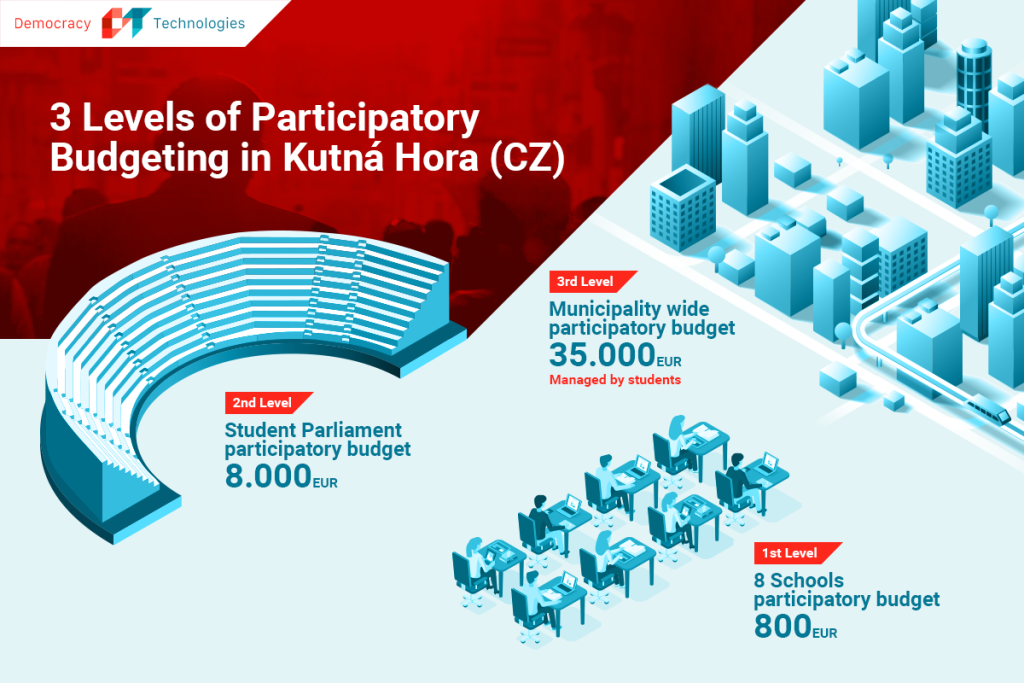The city of Kutná Hora in the Czech Republic first implemented school Participatory Budgets in 2019. In 2020, they followed this with a city-wide PB – run in part by the students who administered the school PBs. The city-wide PB is conducted online using the app Munipolis. We spoke to Vít Šnajdr, Deputy Mayor of Kutná Hora, and Karolina Vilímová, Chairman of the Council of Student Parliaments of Kutná Hora, about their experiences.
Democracy Technologies: Why did you decide to introduce participatory budgeting in your city’s schools?
Snajdr: At the time, we had two problems to confront: first, we didn’t have a city students’ parliament; and second, the city didn’t use participatory budgeting. At first, I saw these problems separately. Then I raised the idea that they could be combined in a single project. Together with the Participation Factory, we came up with a concept that connects the two areas.
DT: How is the school’s participatory budgeting connected with the city’s participatory budgeting?
Snajdr: It is a three-level project. The first level is about motivating pupils from our schools. The pupils propose projects to improve the environment in their school and vote using the app. The second level is the city students’ parliament which among other things works with students in participatory projects to improve public spaces. An important aspect is that the students’ parliament works on the same principle as the city council.
The third level is the city’s participatory budget, which allows all citizens over the age of 14 to propose projects and vote on them. It is very important that citizens are accompanied by students in this process. The students manage the project’s website, consult on the proposed projects, organise and moderate public meetings. The students effectively manage the city’s participatory budget.
DT: Karolína, as a student, how did you get involved in participatory budgeting? What is your role?
Karolína: I first got involved in the project in school because I was head of my school parliament, and this is how the project started. In terms of the city’s PB, I attended the council of school parliaments, which brings together all of the school parliaments in our city. While I was there, I was invited to get involved in the city PB. I was basically the manager of participatory budgeting together with three other students.
DT: What did you personally learn during the process? Has it changed how you see politics?
Karolína: Yes, it was great for me because I got to know the city better. I learned so much about the whole process. Before I started working on this, I didn’t know what participation was.
DT: Were you able to apply what you learned through the school PB to the city-wide PB?
Karolína: The principles are similar, but the city participatory budget is more extensive, so it was harder. But having worked on the school’ participatory budget] helped me a lot, because I understood how the voting worked, and it helped us to figure out how we were going to do it.

DT: How much does the participatory budgeting cost the city?
Snajdr: It is a low-cost project. We spend up to 2,000€ annually for the project organisation, so it is very inexpensive. The students’ involvement reduces costs, because they work for a nominal remuneration. It’s important for students because they gain experience and they can add it to their CVs.
Budgets for individual school PBs are around €800, with each school developing one project.The budget for the city PB is 35,000€ – out of a total city budget of approximately €20 million.Our city we have 10 districts and each district has one project. The budget for each district is between €2,000 and €7,000.
DT: How many people participate? Is the participation rate similar among students and the general population?
Snajdr: Kutna Hora has 20,000 inhabitants. In the first participation phase, around 1,000 pupils from 8 schools were involved. I believe the number was similar in the second phase at the student parliament level. In the third phase, we had 500 citizens involved in the first year. In the second year, we had around 1,000 citizens. And I expect this number will increase.
We used the city media and social media to inform the people of Kutna Hora about the projects. I think that the structure of the project contributed to getting people involved. If your child is involved in participation in school, as a parent, you are likely to get involved as well.
DT: Can you tell me a bit about the digital platform you use in your PB?
Snajdr: It is called Munipolis. It’s an application used by many cities in Czech Republic to communicate with their citizens.
DT: How did you decide on this tool? What were the criteria?
Karolína: In the first year we used a basic Google questionnaire. But we realised that the Google questionnaire was too simple for what we were trying to do. We knew we didn’t want to use paper voting, so we decided to start using Munipolis.
DT: Can you tell us how your voting method works? What is novel about it?
Snajdr: We use the Janeček voting method, which allows the voter to cast several positive votes. Typically, it allows you to cast three positive votes, and one negative one. But because we wanted to be positive about the projects in our PB, we decided not to use negative votes. I think the Janeček is more objective, as it allows you to vote for up to three projects.
Karolína: I think it’s great because every city can adjust the vote to its needs because as I talked about many people work in one area and live in another. So it’s nice to have the opportunity to vote both for projects close to your home and your work.
Snajdr: Next year we will have 27 projects and it would be difficult to ask people to vote for just one!
DT: What kind of projects were implemented from the PB so far?
Snajdr: The projects from last year included playgrounds, green spaces, benches and dog parks. The basic criteria for projects is that they have to improve public spaces.
DT: Karolina, what do other students think about the participatory budgeting project? Does everyone know about it?
Karolína: I don’t think everybody knows about it. My friends are really impressed, they think it’s great that students are working on something like this. The school parliament was impressed, too.
DT: Would you recommend other students to participate in the future? Is it something that you already recommend?
Karolína: Of course I would recommend it. You learn so many things about real life, you get to know your city better. Yes, that is definitely the answer.
